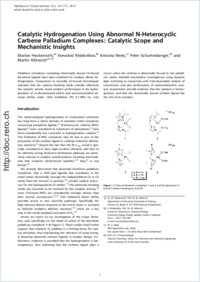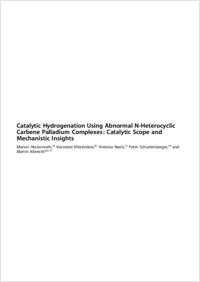Catalytic hydrogenation using abnormal N-heterocyclic carbene palladium complexes: catalytic scope and mechanistic insights
- Heckenroth, Marion Department of Chemistry, University of Fribourg, Switzerland
- Khlebnikov, Vsevolod School of Chemistry & Chemical Biology, University College Dublin, Ireland
- Neels, Antonia XRD Application Lab, CSEM, Neuchâtel, Switzerland
- Schurtenberger, Peter Physical Chemistry, Center for Chemistry and Chemical Engineering, Lund University, Sweden
- Albrecht, Martin Department of Chemistry, University of Fribourg, Switzerland - School of Chemistry & Chemical Biology, University College Dublin, Ireland
-
04.10.2010
Published in:
- ChemCatChem. - 2011, vol. 3, no. 1, p. 167-173
English
Palladium complexes containing abnormally bound C4-bound dicarbene ligands have been exploited for catalytic alkene hydrogenation. Comparison to normally C2-bound homologues indicates that the carbene bonding mode critically influences the catalytic activity. Good catalytic performance in the hydrogenation of cis-disubstituted olefins and non-isomerizable terminal olefins under mild conditions (RT, 0.1 MPa H₂) only occurs when the carbene is abnormally bound to the palladium center. Detailed mechanistic investigations using dynamic light scattering in connection with time-dependent analysis of conversions, and also performance of substoichiometric catalytic experiments provide evidence that the catalysis is heterogeneous and that the abnormally bound carbene ligand has the role of an activator.
- Faculty
- Faculté des sciences et de médecine
- Department
- Département de Chimie
- Language
-
- English
- Classification
- Chemistry
- License
-
License undefined
- Identifiers
-
- RERO DOC 22271
- DOI 10.1002/cctc.201000270
- Persistent URL
- https://folia.unifr.ch/unifr/documents/301930
Other files
Statistics
Document views: 111
File downloads:
- pdf: 313
- Supplementary material: 135

